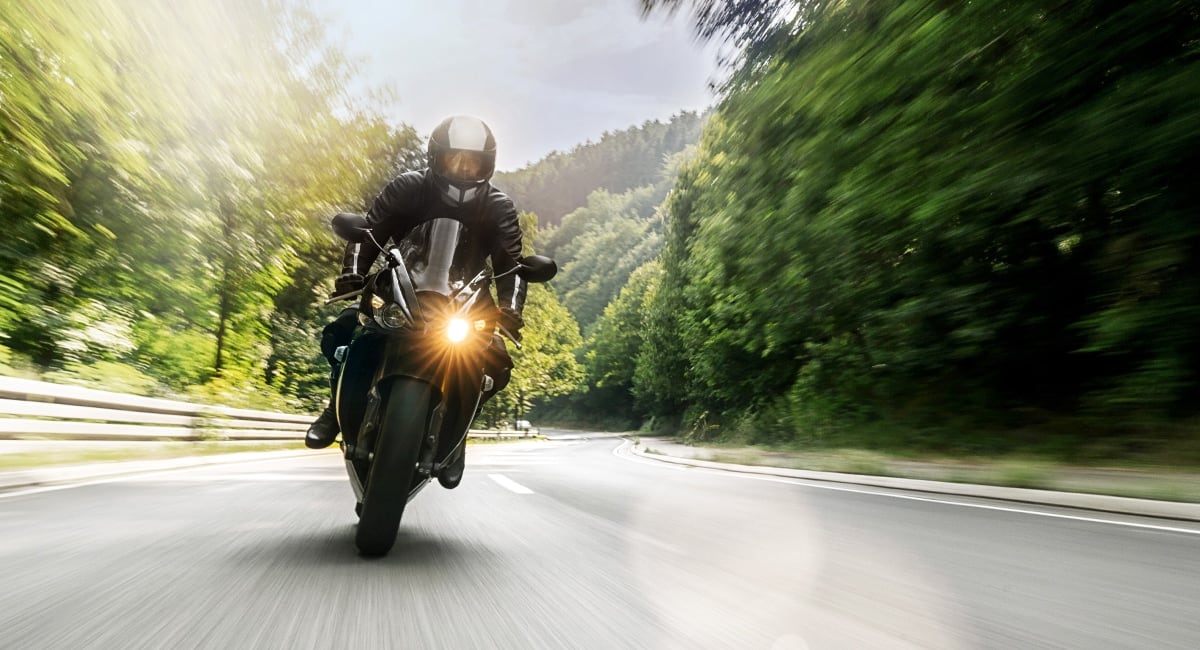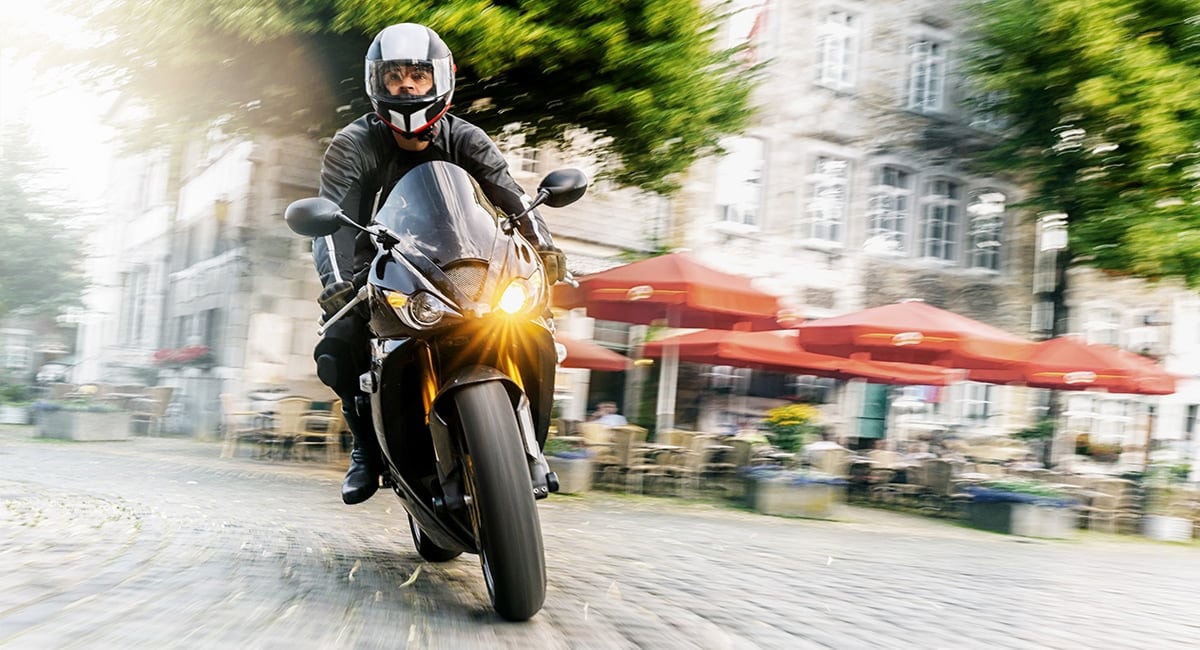Are you interested in our solutions? Then write us a message. Our sales team will be happy to help you.
Motorcycling is freedom, fun, and speed. Motorcycling is sport in all weathers. For many, motorcycling is an attitude toward life.
But motorcycling is also dangerous. The figures speak for themselves. Worldwide, around 3,500 people die every day in traffic accidents, with almost one-quarter involving two-wheelers. On average, the risk of fatal injury is up to twenty times higher for motorcyclists than for car drivers. In Germany alone, the number of fatal motorcycle accidents increased again by six percent in 2017. Motorcyclists losing control of their vehicles or colliding with other vehicles are equally accountable for most accidents.
From a statistical standpoint at least, those frequently out and about on their motorcycles are regularly risking their lives. Even experienced bikers are not exempt from this risk. Unlike car drivers, motorcyclists are still obliged to dispense with a range of assistance and safety systems which can prevent dangerous situations or even save lives in emergencies. Reason enough therefore for Bosch to effect a change and raise safety on two -wheels or with powersports vehicles to a new level using smart technology.
One of the international development goals of the United Nations is to halve the number of traffic casualties by 2020. Bosch is already supporting this goal today with innovative safety technology and even more ambitious long-term goals: thanks to comprehensive motorcycle safety, the future should see motorcyclists no longer dying in road accidents. In order to achieve this, Bosch is introducing its safety technology step by step into all segments and markets. In this context, Bosch is also expanding its focus beyond Europe and North America. Bosch accident research analyzes regional differences across the world and provides support in needs-oriented development.
Especially in the large emerging markets with their distinctive mass mobility on two wheels, accident figures are very high.
In India alone, around 49,000 people died in two-wheeler accidents in 2017. The ASEAN region records approx. 27,000 victims every year.
And nine out of ten accidents are attributable to human error. All of this shows the great potential of smart assistance systems helping riders to handle critical situations or even prevent them in the first place. And without any compromises in terms of two-wheeler fun. Bosch has made great progress in the development of these systems in recent years and is already working intensively on the next levels of safety for motorcycles and powersports vehicles.

The first important steps toward improved motorcycle safety have already been taken by Bosch in the form of systems which ensure improved riding stability. The motorcycle ABS (antilock braking system) specially developed for two-wheelers supports safe braking and ensures shorter braking distances as well as a lower risk of falling, even during abrupt braking maneuvers. Motorcycle stability control (MSC) supports riders in all situations, whether riding straight ahead or in cornering maneuvers, braking or accelerating.
Bosch goes a decisive step further with smart advanced rider assistance systems (ARAS) which constantly perceive the motorcycle surroundings and are therefore capable of providing the rider with predictive support. These systems help to maintain a safety distance from vehicles in front and to maintain speed levels (adaptive cruise control) or warn the rider of potential dangers (forward collision warning, blind spot detection). Accordingly, they contribute toward preventing critical situations from arising in the first place.
In an effort to achieve its goal of comprehensive motorcycle safety, the future will see Bosch driving the technology available to date and consistently developing new safety and assistance solutions for a variety of accident risks. For example, preventing two-wheelers from suddenly skidding sideways in corners as a result of grit or similar on the road surface. In a research project on preventing skidding, Bosch has also tested an innovative safety system which uses counter-pressure to keep the motorcycle upright in such critical situations.

To prevent critical situations and accidents from arising in the first place, Bosch is also supplementing its assistance systems with the manifold opportunities offered by connectivity. Communication between the connected motorcycle and other vehicles, the cloud, and infrastructure makes it possible for the rider to receive more comprehensive information in a timelier manner, and be provided with warnings of possible dangers.
This enables riders to adapt their performance proactively, for example, by reducing speed or choosing another route. And if an accident has already occurred, connectivity ensures that emergency responders arrive at the scene faster and better prepared.
Direct communication between motorcycles and other road users nearby can make an essential contribution toward more safety in road traffic. For example, at intersections: one frequent cause of accident is when car drivers fail to see motorcycles at intersections. When cars and motorcycles exchange information on their respective positions, direction of travel, vehicle type, and speed, while maintaining a certain distance from each other, the driver and rider are prewarned in time and can adapt better to the pending situation. And this long before the other vehicle can be seen or perceived by the driver or the surround-sensor system.
To ensure that safety-relevant information and warnings issued by assistance systems are reliably received by motorcyclists, Bosch has developed the integrated connectivity cluster specially for two-wheelers and powersports vehicles, which displays relevant information supplied by safety and comfort systems. The integrated connectivity cluster also shows content from the rider’s smartphone, the internet, and other connected devices on the display. The crystal-clear screen is easy to read in all weather conditions, thereby contributing to rider safety. The integrated connectivity cluster has a wireless network connection as well as USB, Bluetooth and CAN interfaces, and is compatible with the mySPIN smartphone integration solution offered by Bosch.
With mySPIN, motorcyclists and powersports drivers are always connected and can even access their smartphone content and apps when on the road. To ensure riders are not distracted unnecessarily during their ride, all displayed content is adapted to make it more rider-friendly. Only the most important functions and information are shown on the display, making sure that riders can see any important information at a quick glance. After all, motorcyclists cover around 100 meters during a three-second period of distraction at a speed of 120 km/h – this is a risk which should not be underestimated. The various functions are operated both safely and intuitively using rotary controllers and buttons on the handlebars.
Advanced rider assistance systems keep a constant eye on what is happening in the motorcycle’s surroundings, they never tire, and they react faster than human beings in an emergency.
through proactive support of the rider
through support in many riding situations
Are you interested in our solutions? Then write us a message. Our sales team will be happy to help you.

